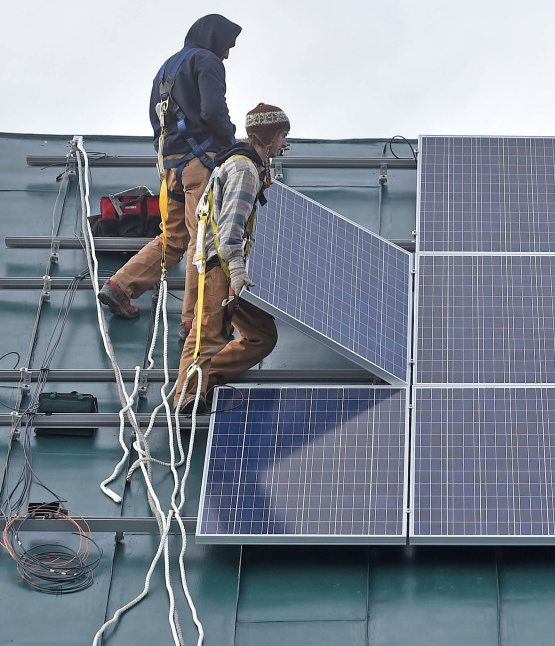HALLOWELL — The Maine Public Utilities Commission is proposing new rules that would phase out incentives for homeowners with solar electric panels.
Meeting on Tuesday, commissioners proposed a change that would grandfather incentives for 15 years for residents who already have solar panels installed at their homes, and would limit benefits for new solar owners to 10 years.
The decades-old incentive requires utilities to pay small energy generators the full retail price for all the electricity they send into the grid. Those payments chiefly help recover the investment in solar-electric panels, which can run $10,000 or so at an average home.
The new proposals act as a starting point for an overhaul of Maine’s net-energy billing rule, often called net metering, a controversial practice nationwide. As solar’s popularity grows, utilities say those payments are shifting the cost of serving homes with solar panels onto other customers. Clean-energy advocates counter that the value of this energy actually is greater than the cost of service. Both sides cite figures and studies to support their claims.
Dylan Voorhees, clean energy director at the Natural Resources Council of Maine, said that overall, the PUC’s proposals weaken net metering and move the discussion around solar in the wrong direction. Whatever the PUC finally does, the rules will become a source of confusion because lawmakers intend to reintroduce a comprehensive solar bill when the Legislature reconvenes in January, Voorhees said.
“I think it will suck a lot of air out of how to deal with solar in Maine,” he said.
LEGISLATOR SLAMS NARROW FOCUS
Sara Gideon, assistant majority leader in the Maine House, lobbied in the last legislative session for a wide-ranging solar energy bill that would have updated net metering. In a statement, she took the PUC to task for its proposals.
“Maine needs a comprehensive solar policy. Unfortunately, the PUC’s narrow focus on a single part of the broader solar policy doesn’t help our state’s ability to open new markets that create jobs and lower costs for homeowners, businesses and communities,” the Freeport Democrat said. “This past session’s solar bill did not simply look at net metering in isolation, but was crafted to help our constituents who are clamoring for access to community, commercial and municipal solar. That responsiveness and broad view is why policymaking should be left to lawmakers.”
Projects worth millions of dollars stalled last spring after Gov. Paul LePage vetoed a compromise solar bill, which the Legislature failed to override by two votes, pitting LePage and his mostly Republican allies against Democrats. The governor has long opposed incentives for solar power, saying they would increase energy prices for homes and businesses that can’t afford solar panels, and increase the cost of doing business in Maine.
Reacting to the PUC’s proposals, LePage’s energy director, Patrick Woodcock, said he would review the specifics with an eye toward how they would affect ratepayers.
“As solar is increasingly installed in the state of Maine,” he said, “it is important that our businesses and low-income populations are not saddled with additional costs.”
SOLAR INSTALLER ADVISES CAUTION
Key interest groups on Tuesday were trying to decipher details from the rough outlines sketched by the commission.
Vaughan Woodruff, a solar installer and owner of Insource Renewables in Pittsfield, said he was concerned that the commissioners had made the assumption that net metering imposes a cost on other ratepayers. Some studies, including one done for the Maine PUC, reach the opposite conclusion – that net metering saves money at times of peak demand, reduces pollution from power plants and has other benefits.
“Net metering has never received a fair trial in Maine,” Woodruff said. “The PUC’s own Value of Solar study indicates that Maine solar owners provide more value to the grid than they receive. Before we talk about changing rules, we deserve a thorough analysis of the benefits of net-metered systems.”
On the other hand, another PUC proposal to increase the size of projects that qualify for net-energy billing from 660 kilowatts to 1 megawatt is a positive step, Woodruff said, and would put Maine more in line with some other states.
The growth of solar in New England is being driven in large part by policies that promote renewable energy in Massachusetts and, to a lesser extent, Connecticut. Roughly 1,774 megawatts of solar currently are installed in the region and 1,241 megawatts of that are in Massachusetts, where incentives are generous and policies supportive. Connecticut trails with 273, and Vermont is third with 154. Maine has by far the least of the six states, at 20 megawatts.
But the question of net metering has been controversial around the country, as opponents say ratepayers should not have to help offset the cost of someone’s home solar installation. They argue that the price of home solar electric systems has dropped about 40 percent in recent years and homeowners no longer need incentives.
According to the North Carolina Clean Energy Technology Center at North Carolina State University, more than 25 of the 39 states with net metering policies are reconsidering them. Seven states are looking at imposing caps on net metering capacity.
NOT A ‘SCORCHED EARTH’ APPROACH
In the changes unveiled Tuesday, PUC members suggested cutting compensation on the delivery portion of Central Maine Power’s monthly bill by 10 percent a year over a decade for new solar homeowners. That’s a softer landing than the glide path sought by LePage. In comments filed at the PUC, his office recommended that current customers get the full retail price for no more than three years.
Tim Schneider, Maine’s public advocate and an architect of the failed solar bill last spring, agreed that some legislative action is likely, but he was encouraged by some of the PUC’s suggestions.
“It looks as though the commission has attempted to craft a path that provides some certainty for solar customers and predictable future pricing for the solar industry,” he said. “This is not the scorched earth approach that many had predicted.”
The three commissioners also proposed a moderate increase in the project size that qualifies for the payments, as well as stronger consumer protection requirements for customers. They also signaled a desire to consider the current limitations on community energy arrangements, in which a group of customers purchases shares of solar projects.
RULEMAKING PROCESS TO BEGIN
After taking initial public comments on the future of net metering this summer, the PUC has now formally weighed in on how it thinks the conversation should move forward in Maine. The review was triggered this year by the part of the rule that says the PUC must revisit the practice once peak power production reaches 1 percent of CMP’s installed capacity.
“The commission received many comments over the last several months regarding this topic,” said Mark Vannoy, commission chairman. “In light of changes in the technology and costs of small renewable generation, particularly solar PV, we felt that opening a rulemaking process to consider changes to the rule was the prudent course of action.”
As part of the rulemaking procedure, the PUC will now accept comments and schedule a public hearing this fall. The commission expects to take some action before year’s end.
Send questions/comments to the editors.




